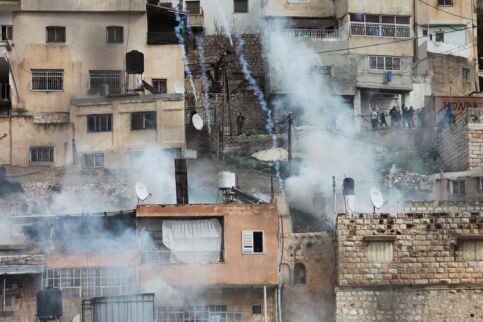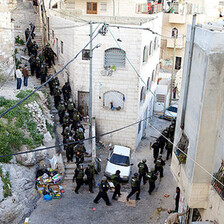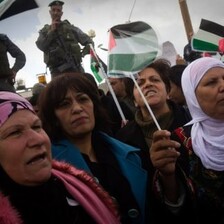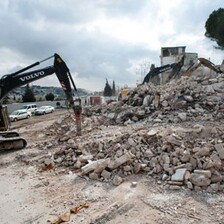The Electronic Intifada 28 March 2011

Tear-gas fired by Israeli soldiers at Palestinians in Silwan, occupied East Jerusalem. (Anne Paq/ActiveStills)
In the last month Palestinians in Jerusalem continued to face ongoing violence and settler takeovers of their homes. As Israeli forces abducted and arrested children in the Silwan area, an order by the municipal court could force a family to “share” a room in their home with settlers. Meanwhile, a United Nations expert called Israeli policies in East Jerusalem consistent with characteristics of apartheid and ethnic cleansing.
Ras al-Amoud
In Ras al-Amoud, an Israeli court recently ruled that a Palestinian family will have to move out of one room in their home as Israeli settlers and an armed Israeli guard could move in in a matter of weeks.
After 11 years of legal battles, the Hamdallah family was ordered to move their furniture and belongings out of one of their bedrooms and their front yard. Their home is next to settler houses in the illegal settlement colony of Maaleh Zeitim.
The Israeli daily Haaretz reported that American billionaire and settler financier Irving Moskowitz waged the long battle against the Hamdallahs in court, claiming that he “acquired” the land from an ultra-Orthodox Jewish organization. The Hamdallah family has lived in the home since 1952; however the Jerusalem district court ruled in 2005 that they had to “evacuate parts of the home built after 1989” (“Palestinian family ordered to share East Jerusalem home with Israelis,” 10 March 2011).
Haaretz added that Moskowitz’s lawyer “convinced the bailiff’s office that this includes one bedroom and the front yard.”
Sixteen members of the family live in the home. Speaking to Haaretz, Khaled Hamdallah said that three persons live in the room slated for evacuation. “We don’t know what to do,” he told Haaretz. “I don’t even care anymore. I feel like dying. They want to throw us out completely. The police is with them, the judges are with them. So what’s the point?”
Shlomo Lecker, the lawyer representing the Hamdallah family, managed to delay the settler’s move-in date for one month. But if the legal team fails to overturn the court’s ruling, the family could very well face sharing their home with armed settlers — or make the decision to leave the home altogether.
Speaking to the UK Guardian newspaper, Lecker said that “[t]his group of settlers are very determined to get the family out and they are trying every possible trick” (“Palestinian family in East Jerusalem told to make way for Jewish settlers,” 10 March 2011).
Silwan
Meanwhile, in the village of Silwan, just outside the gates of the Old City, residents face regular attacks by Israeli forces as popular resistance continues against settler takeovers of homes.
According to the Wadi Hilweh Information Center (SILWANIC), Israeli forces “indiscriminately fired” tear gas in two areas of Silwan on 26 March, during another round of intense clashes spurred by the presence of Israeli settlers and soldiers.
SILWANIC also reported that “[h]eavy numbers of Israeli forces have moved in to Baten al-Hawa and Bir Ayyub districts of Silwan after several Molotov cocktails were thrown at the Palestinian house occupied by Israeli soldiers in Baten al-Hawa” (“Heavy military presence in Silwan after Molotov cocktails thrown,” 26 March 2011).
The report added that live ammunition was fired by soldiers, though no injuries were sustained. Saturday’s clashes followed sweeping arrests by Israeli soldiers the day before, in which nine Palestinians were arrested from their homes (“Israeli forces carry out massive dawn raid,” 25 March 2011).
On 18 March, Ma’an News Agency reported that Palestinian residents of Silwan set fire to a house taken over by settlers. An Israeli border guard was burned and hospitalized, the report added (“Palestinians burn settler home in Jerusalem,” 18 March 2011).
Israeli forces fired tear gas and rubber-coated steel bullets, Ma’an reported. During the clashes, a Palestinian photojournalist was also injured and taken to the hospital.
Palestinian children targeted in Silwan
On 14 March, Israeli police forces attempted to arrest three Palestinian children from their homes in the Wadi Hilweh neighborhood of Silwan (“Israeli police attempt to seize children from their home in Wadi Hilweh,” 15 March 2011).
The police eventually left, the report stated, but ordered the children’s uncle to bring the children to the police station for “investigation.” After interrogation, “the children were released from police custody at a bail of 20,000 shekels [US $5,620] per child,” SILWANIC added.
It has been a regular policy of Israeli police to target, arrest, detain and interrogate children in Silwan.
Days earlier, SILWANIC reported, Israeli police arrested four boys in an early-morning raid on 9 March, charging the youth with stone-throwing.
Silwan activist Ibrahim Aoudeh was released from Israeli detention on 10 March after being jailed for ten months. Twenty-two-year-old Aoudeh was arrested and jailed on charges of participating in clashes. SILWANIC reported that a celebratory procession wound its way through Silwan as local leaders gave speeches condemning Israeli policies while insisting residents “remain steadfast in their resistance to the settler colonization of the village” (“Ibrahim Aoudeh released, brother Mohammed remains behind bars,” 10 March 2011).
Ibrahim’s brother, Mohammed, also an activist, remains in an Israeli jail after being arrested for his participation in recent clashes. Their younger brother, 10-year-old Muslem, has been the target of Israeli police forces over the last year. Last March, Muslem was abducted in the middle of the night by Israeli police, who interrogated him.
More recently, Muslem was abducted again by Israeli forces in February, along with several other boys, and he was beaten so severely that his skull was fractured and his entire body sustained serious bruises, SILWANIC reported (““How can they criminalize me? I’m ten years old.” The plight of Muslim Aoudeh,” 6 March 2011).
Qatanna
Ma’an News Agency reported that two Palestinians were injured and five were detained on 23 March when an Israeli patrol entered the village of Qatanna and opened fire with rubber-coated steel bullets. All of those detained were 15 and 16 years old, Ma’an added (“Clashes near Jerusalem: 2 injured, 5 detained,” 23 March 2011).
Israeli Department of Education bans Palestinian curricula
The Israeli department of education passed a resolution on 7 March for all the recognized and state-financed public and private schools, mandating that every school abide by supervised curriculum standards and programs.
The Palestinian news agency WAFA reported on 22 March that Palestinian educational leaders issued a strong statement saying they would continue to teach Palestinian curriculum in occupied East Jerusalem schools.
They considered the ministry’s decision a step towards Judaizing East Jerusalem, starting with the education sector.
Samir Jibril, director of Palestinian education in East Jerusalem — administered by the Palestinian Authority — asserted that “the curriculum is one the rights [with which] the Israeli side is not entitled to interfere … [we consider] this step as a prelude to impose the Israeli curriculum in East Jerusalem,” WAFA reported (“Jerusalem: Adherence to Palestinian Curriculum,” 22 March 2011).
“Jibril demanded the schools’ administrations not to deal with the Israeli resolution and called [on] the private schools to take a national decision by continuing to teach the Palestinian curriculum without any deletion or change in the content,” WAFA added.
70 Palestinian homes demolished since January
The United Nations issued a report on 21 March that showed a two-fold increase in the numbers of house demolitions in the West Bank, including occupied East Jerusalem, since the beginning of the year, Ma’an News Agency reported (“UN: Massive increase in home demolitions,” 22 March 2011).
The UN agency for Palestine refugees (UNRWA) “recorded 70 demolitions since the start of 2011, displacing 105 Palestinians, of whom 43 were under the age of 18. The demolitions were carried out across the West Bank and East Jerusalem, and ordered by Israeli police, municipal officials and by mandate of the Civil Administration,” Ma’an reported.
UNRWA spokesman Chris Gunness said that in occupied East Jerusalem, the Israeli government has zoned approximately 13 percent of the city for Palestinian construction, “most of which is already incredibly built up … They are forced to build without a permit.”
Last month, the High Commissioner for Human Rights “described this as discriminatory,” he stated. Gunness labeled home demolitions as a “triple humiliation, with families forced to build illegally, faced with the demolition of their homes, a process that all too often occurs in front of the faces of their children.”
UN expert: Israel is engaged in ethnic cleansing in Jerusalem
Richard Falk, the UN Special Rapporteur on human rights in the occupied Palestinian territories, delivered a report to the UN Human Rights Council on 21 March in which he described Israeli policy in East Jerusalem as ethnic cleansing.
The council released an abridged version of Falk’s statements, and reported that he “reminded the Council that the fundamental right of Palestinian self-determination was constantly abridged by Israeli settlement expansion in East Jerusalem and the West Bank … The death of over 1,000 children, the continued building of illegal settlements, and the ill treatment of prisoners were barbarities that could not continue” (“Human Rights Council holds interactive dialogue with Special Rapporteur on situation of human rights in Occupied Palestinian Territories,” 21 March 2011).
Falk stated that the International Court of Justice should be called upon to define what it means for Israel “to continue an occupation with characteristics that were associated with colonialism, apartheid and ethnic cleansing.”
Israel has refused to allow Richard Falk to enter the country to continue his mandate as UN Special Rapporteur. He told the council that he plans to attempt to enter in April anyways, and hopes that the Israeli government will allow his entry into the occupied Gaza Strip and the West Bank.


